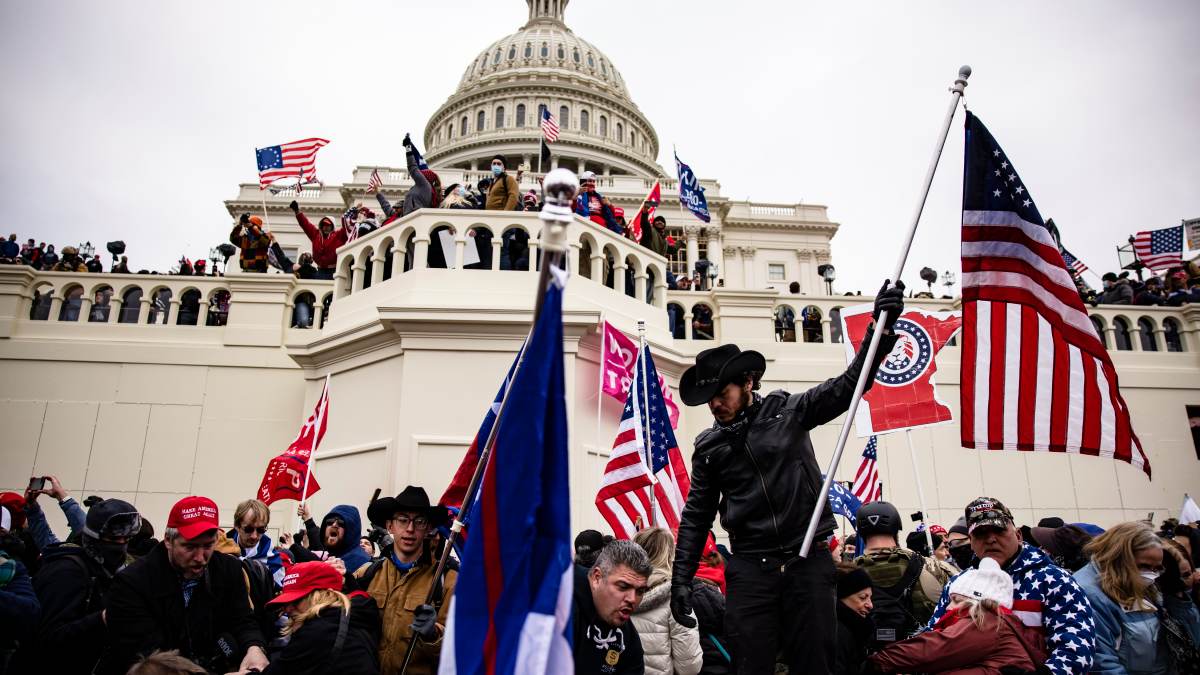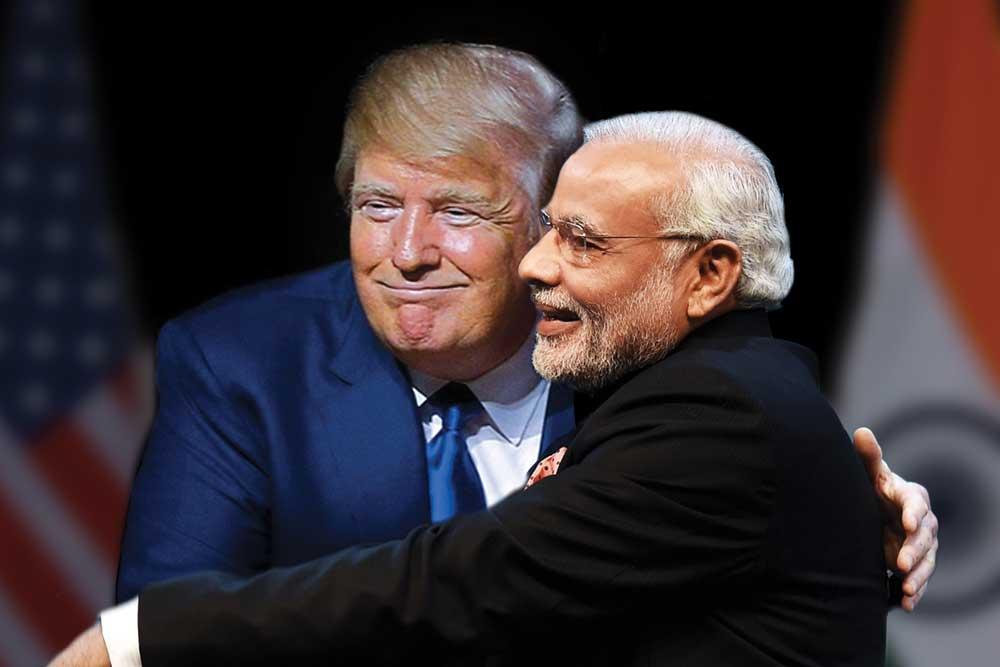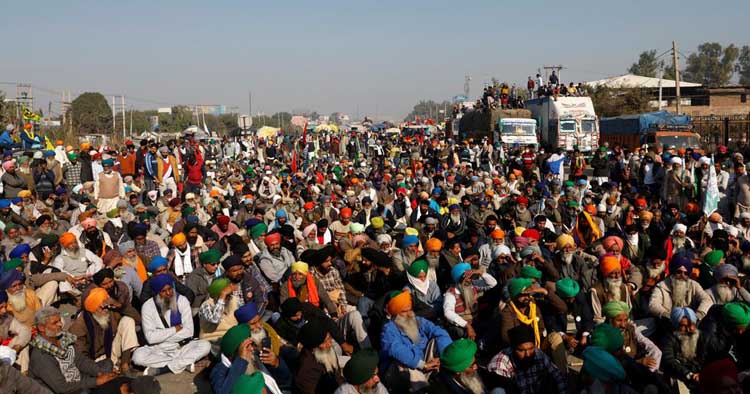A Mob in Washington, DC, Vs The Sangat at Delhi’s Borders
With a broad sweep glance across the capitals of two democracies, the oldest and the biggest, senior journalist S P Singh, in this WSN exclusive commentary juxtaposes the latest political upsurges in the US and India and the reaction of those at the helm of affairs. In this literal comparison between Mobocracy and Democracy, the author underlines where electoral politics is failing on the question of ethics even as the politics of resistance is pushing it back to the centre stage. Every politics needs a crowd — the touchstone of ethics is in deciding whether it marshals a mob or masses in Guru-roop Sangat.
![With a broad sweep glance across the capitals of two democracies, the oldest and the biggest, senior journalist S P Singh, in this WSN exclusive commentary juxtaposes the latest political upsurges in the US and India and the reaction of those at the helm of affairs. In this literal comparison between Mobocracy and Democracy, the author underlines where electoral politics is failing on the question of ethics even as the politics of resistance is pushing it back to the centre […]](https://www.theworldsikhnews.com/wp-content/uploads/2021/01/Washintong-crysis-360x266.jpg)
IT IS NAUSEOUS TO CONCEDE but how can one ignore the international political realities and the permutations and combinations of global power? The truth is that in ways more than one, the president of the United States of America is the president of most people in most countries of the globe, thanks to the skewed equations of wealth, weapons, power and influence. It’s not for nothing that from Hollywood to underground pamphleteering, he is often referred to as the most powerful person in the world.
Now, this most powerful person on the planet has been sworn to this high office, the backdrop being provided by thousands of troops in camouflage and armed to the hilt, manning rooftops and the Pennsylvania Avenue. The world’s most powerful, equipped and deadliest secret services agency, the FBI, issued warnings about possible, and imminent, attacks on the symbols of democracy, including Congress and Senate, state capitals and institutions, by armed militia that has now won for itself the new and real name – America’s home-grown domestic terrorists.
Joe Biden is in the White House. A woman of colour is the next in line. The Sangat is on the borders of the capital. The tide is turning. The tractors are coming. The parade will start soon. Things will change.
The danger has been lurking around for a very long time. When white supremacist mobs attacked the Capitol Hill on January 6, overwhelming the mighty democracy and undermining every saner streak of politics, eventually leaving behind a trail of dead bodies — five human beings and the façade of American security — the world knew how fragile could be the machine called the world’s oldest democracy. On show was the shape of the new enemy, its power, reach, intent and possibilities. No wonder, it has now been given an official identifying tag —the greatest domestic terrorism threat to the United States of America.

Crowd Funding of Politics and the Question of Ethics
How come a strong, throbbing democracy with all its attendant traditions buckled so fast? What exactly was the charisma of a boorish Donald Trump? Why did his unintelligible gibberish over Tweets have such a profound effect on the vast number of masses? How come a lout on the Hill proved to be a magnet for the disillusioned and the disempowered? What made thousands rush to the aid of someone who was a cry baby, who could not stomach a defeat in a free and fair election, who was the messiah of the entitled, and who represented establishment in every which way? What went wrong where that we had to live to see insanity walking around with a confederate flag?
This gap between what it means to be a mob or Sangat is the measure between morality and our politicians. Politics needs crowds. The ethics of a politician determine whether it should be a mob or Sangat.
Trump and the ideals of the United States of America are two different entities from two different planets, and yet, one claimed the ownership of the other, and escaped scot-free in an Air Force One chopper from the White House lawns to whatever future awaits him in Florida, or Mar-a-Lago?

Now that Trumpian days are behind us and he has won the ignominy of a second impeachment, there is talk about pressing the reset button on history. Politics needs a new narrative. It badly needs a return to the issue of ethics. We have disengaged for far too long from this dimension, hoping that merely good laws, free elections, administrative tweaks and lip service to institutions will fix democracy. We needed ethics, and we learnt this from the shoddiest teacher we could find: a New Yorker called Donald J Trump.
You cannot legislate ethics. You can legislate management, administration, economy, elections, traffic, local bodies, town hall meetings. You cannot legislate goodness, nicety, decency. Morality is not a subject matter of law. Ethics cannot be divided into juridical clauses. That is the role of politics.
We had for long forgotten and compromised the notion of ethics in politics. We believed in law-making, not in the construction of an inner being. Any student of democracy now understands that human beings have learnt only a few basic things when it comes to facilitating public life through laws. You cannot legislate ethics. You can legislate management, administration, economy, elections, traffic, local bodies, town hall meetings. You cannot legislate goodness, nicety, decency. Morality is not a subject matter of law. Ethics cannot be divided into juridical clauses. That is the role of politics.
The Lord was compassionate not because the law of the land required it; his compassion must affect the laws of the land. You do not, and you cannot pass a law to require someone to be a nicer person.
Trump was the world’s literal proclamation of the death of ethics in politics. Plain blatant lies, flagrant greed, massive tax evasion, pronounced racism –Trump portrayed what politics could stoop to when the question of ethics goes out the window.
Trump was the world’s literal proclamation of the death of ethics in politics. Plain blatant lies, flagrant greed, massive tax evasion, pronounced racism –Trump portrayed what politics could stoop to when the question of ethics goes out the window. Once we give up on the ethical strain, flaws creep in fast. A politician gets greedy, another cuts corners, yet another isn’t averse to lining his pockets, one evades taxes, one overlooks violence, one has a racist streak, one is masochistic, another cares two hoots about the environment.
Once ethics stop mattering, we start getting these strains in packages. A corrupt fellow who can get elected using a little bit of violence and ill-gotten money. An agent of the oil lobby who will inject cash into the lobbies to formulate anti-environment policies. In Trump, all of these strains came together. We carry pieces of these little strains in our puny little minds because, like him, we, too, thought ethics are too bothersome to be a political issue.
After all, we understood that they are all thugs –Sab Chor Hain. Once such a narrative over decades reinforces the idea that all are thugs, there comes a thief who smells an opportunity and has a megaphone: a reality TV star with a gold commode at home and claiming the tag of an outsider.
After all, we understood that they are all thugs –Sab Chor Hain. Once such a narrative over decades reinforces the idea that all are thugs, there comes a thief who smells an opportunity and has a megaphone: a reality TV star with a gold commode at home and claiming the tag of an outsider. He goes to the Townsquare and appeals to all who are sick of the establishment. Elect me, follow me, I’m the messiah. The disgusted, the disappointed, the unwashed, the disempowered join the racists and the supremacists. They see their own image in him. Soon, we have a leader: rich, boorish, selfish, unconcerned, unlawful, powerful, self-aggrandizing lout. In some little ways, he looks like that devil in us, the beast that we were supposed to tame but who is out there without a mask.
As we cast such boor to the dustbin of history, our politics once again has a tryst with destiny, an opportunity to focus on the central question we had skipped —How do we harken back to the question of ethics in politics?
The key question is: How do we harken back to the question of ethics in politics?
It needs work. A return to a narrative of ethical dimension is preconditioned on a shared sense of history, a common memory. One has to develop a culture of understanding to decipher the methodology to build a shared heritage of collective memory. Our traditional educational systems will not help, as sorely needed as they are. We need a huge project of popular education, an immense amount of groundwork to turn the people into a citizenry. A citizenry that knows it has rights. The idea cannot be the construction of a citizen with a singular understanding of nation-building but men and women who should have an agency to understand their place and role in history and nation-building.

Once you inject ethics into politics, it becomes difficult to turn people into mere crowds. Then they are citizens. They will indulge in community building and community organization, not crowd forming. Citizens do not turn out as a mob. They turn out as masses. They seek out the like-minded, they sharpen their narrative, they set up meets with those at the variance of views, they interact, they advance arguments, they ram through data and statistics, they work in building a sense of community and a shared future. They learn when to part on an agree-to-disagree note, they know where they can work on the basis of minimum shared values and concepts.
They cannot be turned into mobs with poisonous narratives; they may disagree but they remain Sangat.
That is the essential difference between a mob and Sangat.
A mob is essentially destructive; the Sangat is quintessentially constructive.
A mob is Satan’s glorious achievement; the Sangat is the culmination of years and centuries of hard work in how human beings can build a world together.
Washington, DC saw a mob on the Capitol Hill; and the world knew it needs to learn a lesson.
Delhi, India is witnessing the Sangat on the Singhu-Tikri-Gazipur borders; and the world knows India’s politics and politicians need to learn a lesson.
And that lesson is what a return to the question of ethics can do to your politics.
A mob can only make headlines; the Sangat changes what’s deep inside those heads.
A mob can merely carry a flag-draped around a spear, it can only shed blood on the Capitol Hill in 2021, burn a bakery and some Muslims in the streets of Gujarat in 2002 or maim, lynch and burn Sikhs in the bylanes of Delhi in November 1984, or target Muslims in 2020.
A mob can merely carry a flag-draped around a spear, it can only shed blood on the Capitol Hill in 2021, burn a bakery and some Muslims in the streets of Gujarat in 2002 or maim, lynch and burn Sikhs in the bylanes of Delhi in November 1984, or target Muslims in 2020.
It can only start searching for a Mike Pence to hang, or it can start killing pregnant women a la Babu Bajrangi and his ilk. A mob can find new novel uses for used cycle tyres by setting them afire and garlanding long-haired people in the streets of Delhi merely a few thousand yards from the Raisina Hill.
A Sangat rather opts to talk to itself, its own, its politics. It gathers peacefully. It removes the barricades but sits peacefully at Singhu and Tikri borders for weeks. It trusts the leadership but keeps a keen eye on the goings-on. It exposes the hollowness of the system, the shallowness of the façade of negotiations, but it does not stop believing in the question of ethics of its own politics.
It listens to lectures, participates in kirtan, encourages debate. It falls back on its philosophy, its legacy, its shared heritage, the teachings of the Gurus. It does not give a clarion call to ‘Storm the Capitol’ or to burn the heretics on the barn. It, instead, calls for a Tractor March. It does not incite a mob to destroy a mosque to build a great temple; it, instead, talks of harmony. It does not make distinctions between true citizens and false, it does not need to amend its idea of citizenship; it, in fact, builds a sense of citizenry, of a shared past and a sharable future. Such a society understands the significance of ethics in politics, it lives those ethics, abides by them.
A Sangat rather opts to talk to itself, its own, its politics. It gathers peacefully. It removes the barricades but sits peacefully at Singhu and Tikri borders for weeks. It trusts the leadership but keeps a keen eye on the goings-on. It exposes the hollowness of the system, the shallowness of the façade of negotiations, but it does not stop believing in the question of ethics of its own politics.
On the other hand, a Trumpian crowd can answer the call of violence, it may be ready to kill and spread mayhem.
Across the world, politics is now divided into these canons of crowd formation: Mob and Sangat. Mob versus Masses.
One politics gave a clarion call, and humanity responded as one. The Sangat joined its heads on the Singhu and Tikri borders. The Langar defined Sangat. Rich and poor adopted the humble abode inside and outside the trolleys. Debate throbbed. Discussions happened. Punjab was talking to itself, it was talking to Haryana, it was talking to India, and to the wider world. This was a Sangat in Goshthi -dialogue. A proclamation that of the return of ethics in politics.
Another politics gave a call and a mob descended on the Hill.
A mob enters the lane in which lives a Mohammad Akhlaq. It lynches a Pehlu Khan to death. It wants young men and women in the city’s parks to not put their arms around each other; it wants to control love, and who to love. It wants to decide what to cook. It wants a DNA test of the meat in your fridge. It wants to see from which religion the boy could be who you could marry your daughter. It decides when you can protest or the coronavirus will come to kill you, and it tells you when everything is fine and the leader can address poll rallies without anyone required to sport a mask.
A Sangat joins the protest. It wants food for the hungry, jobs for the unemployed, aid for the poor and rights for citizens. It knows that laws are not divine, they do not descend from the skies along with someone’s Mann Ki Baat; instead, these can be amended and even withdrawn if found anti-people.
A Sangat joins the protest. It wants food for the hungry, jobs for the unemployed, aid for the poor and rights for citizens. It knows that laws are not divine, they do not descend from the skies along with someone’s Mann Ki Baat; instead, these can be amended and even withdrawn if found anti-people.
This gap between what it means to be a mob or Sangat is the measure between morality and our politicians. Politics needs crowds. The ethics of a politician determine whether it should be a mob or Sangat.
It is now for the liberal, left of centre, secular political domain to look inwards and introspect how it is guilty of paving the way for the mob. Why did the hordes of Americans feel so left out that they responded to a Trump? Why did vast masses in India fell for the saffron temptations? How a pragmatically communal approach made way for a programmatically communal force? How a pro-poor agenda became market-driven and a slave to crony capitalism?
The ethics are back in the play. The Right is trembling in fear. Is the liberal ready for the change? Will the Left look inwards? Or will it take the Sangat to unmask them as the secret partners of the Right? It is a question of ethics.
You brought the mob to the Capitol Hill. Your politics destroyed institutions. You are the renegades from the project of education and health for all. You the liberals made space for the radical right.
You answered the mobs. You are now answerable to the Sangat.
It is now a choice between the mob and the Sangat. Choose carefully, very very carefully.
Joe Biden is in the White House. A woman of colour is the next in line. The Sangat is on the borders of the capital. The tide is turning. The tractors are coming. The parade will start soon. Things will change.
The ethics are back in the play. The Right is trembling in fear. Is the liberal ready for the change? Will the Left look inwards? Or will it take the Sangat to unmask them as the secret partners of the Right? It is a question of ethics.
Be the Sangat, unless you are the Mob. We will catch you – at the Capitol Hill or on the Raisina Hill.
The author is a senior journalist, columnist and anchor of the long-running popular but cerebral Punjabi political debate show, Daleel with SP Singh. A Punjabi iteration of this article was published in the Punjabi Tribune. You can access it here. This much expansive piece in English is exclusive to the WSN.
